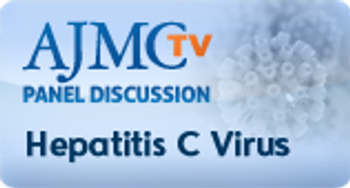
The panelists continue to debate whether hepatitis C virus (HCV) treatment should be administered by primary care physicians (PCPs) or hepatologists.

The panelists continue to debate whether hepatitis C virus (HCV) treatment should be administered by primary care physicians (PCPs) or hepatologists.

While some patients and physicians are not aware of the costs of care, others are concerned about whether they can afford treatment options at all. Dr Miller describes some of the major steps to the incremental benefits and incremental costs incurred by new agents.

Despite the relatively inexpensive 1-time tests to screen for hepatitis C virus (HCV), Dr Fendrick and the panel explore the concerns that plan sponsors may have regarding the costs of new specialty drugs made to treat HCV.

In this clip, the panel discusses the implications of health reform on the treatment of hepatitis C virus (HCV), including what is needed to improve outcomes. This includes educating primary care physicians about how the Affordable Care Act requires health plans to pay for the costs of testing and screening for risk factors of HCV.

Dr Mark Fendrick, University of Michigan, co-editor-in-chief, AJMC, moderates a discussion with Dr David Winston, section head of gastroenterology & hepatology, Cigna HealthCare of Arizona; Dr Steven Miller, chief medical officer, Express Scripts; and Dr Nezam H. Afdhal, associate professor of medicine, Harvard School of Medicine, chief of hepatology, director of Liver Center, Beth Israel Deaconess Medical Center.

The panelists discuss clinicians and their perspectives on financial constraints in treatment of NSCLC.

Dr Peskin begins by stating, costs are exceedingly consequential. Cancer care and treatment is occupying, and with demographics being what they are, increasingly larger relative total cost of care across the US, including various national organizations.

Panelists continue to discuss the use of screening, including PET scanning. They then transition into discussions about molecular testing.

Dr Peskin discusses programs such as Choosing Wisely and how providers must be mindful of high value, cost-conscious, cost-aware care.

Panelists discuss screening recommendations and guidelines, including considerations for screening those patients with a smoking history.

Dr Langer suggests that historically, there's been a monolithic approach to treating NSCLC.

Moderator Michael Chernew, MD, introduces panelists as they discuss the treatment overview of non-small cell lung cancer (NSCLC).

In the final segment of the panel discussion, each panel member gave their final thoughts on the discussion topic.

In this segment, Dr Berger asked about errors in test result interpretation, as well as the problem of inconsistent testing. Panelists showed concern with unregulated direct-to-consumer testing.

It is up to physicians to seek education and training on genetics. Panelists agree that it is important for patients to speak with a genetic counselor even if it is over the phone.

Dr Berger asked the panel how both the June 2013 Supreme Court decision and the Angelina Jolie disclosure impacted genetic testing and counseling. After the Supreme Court's decision there was an influx of inexpensive and more comprehensive genetic tests available.

After introducing panelists, Otis Brawley, MD, chief medical officer, American Cancer Society, David H. Finley, MD, FACS, national medical officer, Enterprise Affordability and Policy, Cigna Healthcare, Joy Larsen-Haidle, MS, genetic counselor, Hubert H. Humphrey Cancer Center, Ellen T. Matloff, MS, research scientist, Department of Genetics, director, Cancer Genetic Counseling, Yale Cancer Center and Rebecca Nagy, president, National Society of Genetic Counselors, moderator, Jan Berger MD, MJ, president & CEO, Health Intelligence Partners, editor-in-chief, The American Journal of Pharmacy Benefits, asked the panel to identify the current unmet needs and challenges in genetic testing.

Panelists all agree that there needs to be evidence and guidelines for both payers and providers. There are not enough resources to try every drug on every patient. Although it will be costly, there needs to be evidence on putting these drugs together as combinations.

Dr Crawford said that in order to pick the appropriate treatment for a diagnosed patient with prostate cancer, it is important to think outside of the box. The National Comprehensive Cancer Network (NCCN) and the American Urological Association (AUA) offer castration-resistant prostate cancer (CRPC) guidelines that serve as the best guideline for payers.

It is an exciting time for prostate cancer due to the growth in new treatments. Dr George said that it is, in fact, both exciting and daunting to have all of these new agents being developed. Currently, there is a shortage in data for practitioners in using the new agents in sequence or combination.

In this segment of the panel discussion, Dr Fendrick asks the panelists if there is now a sense of optimism in reducing the mortality and quality gaps in prostate cancer treatment due to targeted screening and new molecular diagnostics, and immunotherapies.

Dr George notes that in an ideal world a multidisciplinary clinic would not be necessary. Multidisciplinary clinics deliver the tools to practitioner to make the best decisions for their patients.

In this segment, panelists examine prostate cancer treatment as a model for team-based approach. Panelists agree that there is a need for a multidisciplinary approach to care. There

Dr Mark Fendrick opens the discussion by introducing panelists and asking them to discuss the controversy surrounding prostate cancer screening. Panelists address United States Preventive Services Task Force (USPSTF) versus American Urological Association (AUA) guidelines and recommendations.

Panelists agreed that the cost of the new agents discussed to treat melanoma will be a challenge, just as the cost of healthcare as a whole in the United States is a major challenge.

Dr Fendrick asked panelists what they think about the idea of centers of excellence for specific cancers and an evidence-based steerage.

It's very, very complex to try to envision how you would come up with a single payment for an episode and not have a thousand different types of episodes in order to capture the heterogeneity of these diseases and the cost, said Dr Malin when asked to discuss the bundled payment method in oncology.

In this portion of the panel discussion, Dr Fendrick asked the panel whether or not they have noticed cost-related lack of access or nonadherence with the new agents being discussed.

Dr Weber said that despite all of the newer agents in development, the NCCN still offers comprehensive guidelines for the treatment of melanoma.

259 Prospect Plains Rd, Bldg H
Cranbury, NJ 08512
© 2025 MJH Life Sciences®
All rights reserved.
